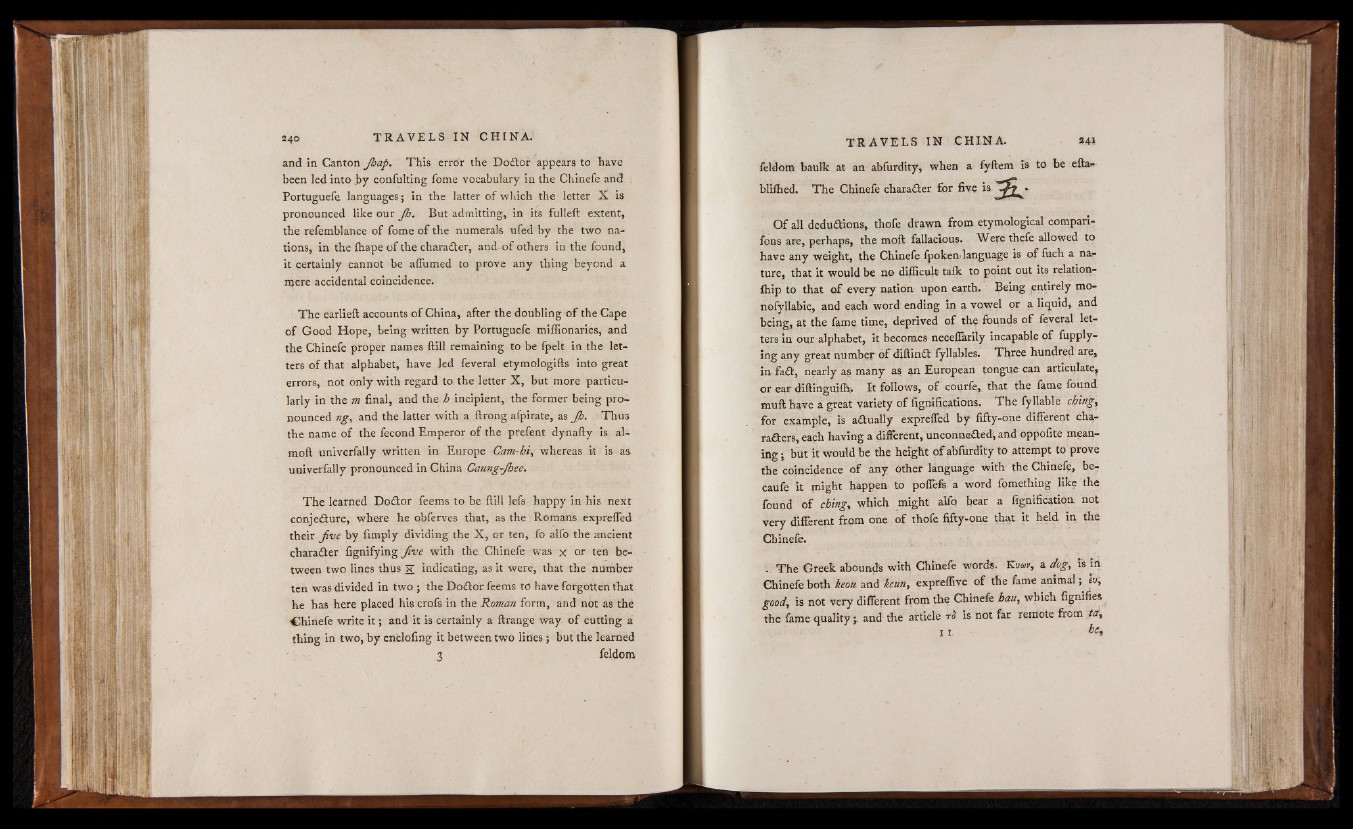
and in Canton jhap. This error the Dodtor appears to have
been led into .by confulting fome vocabulary in the Chinefe and
Portuguefe languages; in the latter o f which the letter X is
pronounced like our Jh. But admitting, in its fulleft extent,
the refemblahce o f fome o f the numerals ufed by the two nations,
in the ihape o f the charadter, and-of others in the found,
it certainly cannot be affirmed to prove any thing beyond a
mere accidental coincidence.
The earlieft accounts o f China, after the doubling o f the Cape
o f Good Hope, being written by Portuguefe miffionaries, and
the Chinefe proper names ftill remaining to be fpelt in the letters
o f that alphabet, have Jed feveral etymologifts into great
errors, not only with regard to the letter X , but more particularly
in the m final, and the h incipient, the former being pronounced
ng, and the latter with a ftrong afpirate, as Jh. Thus
the name of the fecond Emperor o f the prefent dynafty is al-
moft univerfally written in Europe Cam-hi, whereas it is as
univerfally pronounced in China Caung-Jhee.
The learned Dodtor feems to be ftill lefs happy in his next
conjedture, where he obferves that, as the Romans exprefled
their jiv e by limply dividing the X , or ten, fo alfo the ancient
charadter fignifying jiv e with the Chinefe was x or ten between
two lines thus indicating, as it were, that the number
ten was divided in two ; the Dodtor feems to have forgotten that
he has here placed his crofs in the Roman form, and not as the
Chinefe write i t ; and it is certainly a ftrange way o f cutting a
thing in two, by enclofing it between two lines; but the learned
3 feldom
feldom baulk at an abfurdity, when a fyftem is to be efta-
blifhed. The Chinefe charadter for five >
O f all dedudlions, thofe drawn from etymological compari-
fons are, perhaps, the moft fallacious. Were thefe allowed to
have any weight, the Chinefe fpokem language is o f fuch a nar
ture, that it would be no difficult talk to point out its relation-
fhip to that o f every nation upon earth. Being entirely mo-
nofyllabic, and each word ending in a vowel or a liquid, and
being, at the fame time, deprived o f the founds o f feveral letters
in our alphabet, it becomes neceffarily incapable o f fupply-
ing any great number o f diftindt fyllables. Three hundred are,
in fadt, nearly as many as an European tongue can articulate^
or ear diftinguifft. It follows, o f courie,. that the fame found
muft have a great variety o f fignifications. The fyliable ching,
for example, is adtually expreffed by fifty-one different char-
radters, each having a different, unconnedted’, and oppofite meaning
; but it would be the height o f abfurdity to attempt to prove
the coincidence o f any other language with the Chinefe, be-;
caufe it might happen to poffeft a word fomething like the
found o f chiugy which might alfo bear a fignification not
very different from one o f thofe. fifty-one that it held in the
Chinefe.
■ The Greek abounds with Chinefe words. Kmv, a dog, is in
Chinefe both keou. and keun, expreffive o f the fame animal; ev,
good, is not very different from the Chinefe bau, which fignifie*
the fame quality ; and foe article ro is not far remote from td,
11. he,